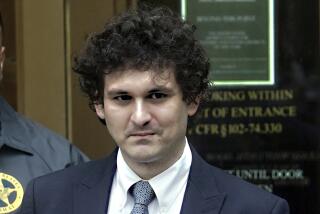Senate report slams JPMorgan for risky trades
- Share via
WASHINGTON — In a scathing report, Senate investigators said JPMorgan Chase & Co.’s huge trading losses last year were caused by high-risk market bets that bank executives failed to catch despite numerous red flags.
The 307-page, bipartisan report released Thursday said the bank tried to hide the $6.2 billion of losses in the so-called London Whale trades from regulators and the public. The report went on to criticize JPMorgan’s federal regulator, the Office of the Comptroller of the Currency, for failing to discover and properly investigate the trades.
The risky bets on complex financial instruments damaged the well-honed image of JPMorgan, the nation’s largest bank, and its chief executive, Jamie Dimon.
“We found a trading operation that piled on risk, ignored limits on risk-taking, hid losses, dodged oversight and misinformed the public,” said Sen. Carl Levin (D-Mich.), chairman of the Senate’s Permanent Subcommittee on Investigations. “There’s a lot of evidence that they maybe are too big to manage and too big to regulate too.”
Sen. John McCain (R-Ariz.), the top Republican on the subcommittee, also blasted JPMorgan. “It’s a shameful demonstration of a federally insured bank taking substantial risks and gambling away billions of dollars on ill-advised trades while regulators were asleep at the switch,” McCain said.
The report sets the stage for what could be a contentious hearing Friday with current and former JPMorgan executives. They include Ina Drew, who retired last year as head of the banks’ chief investment office, the unit that engaged in the trades.
The findings also add new fuel to the battle over pending regulations covering derivatives and the ability of banks to engage in risky trading for their own profit. And the report will probably become fodder for Wall Street critics who want the government to break up the nation’s largest banks.
JPMorgan spokesman Joe Evangelisti said the bank was already aware of many of the problems and had taken “significant steps to remediate these issues and to learn from them.”
“While we have repeatedly acknowledged mistakes, our senior management acted in good faith and never had any intent to mislead anyone,” he said.
The report said Dimon ordered the bank to stop providing the Office of the Comptroller of the Currency with daily profit and loss data from the firm’s investment bank in early 2012 “because he believed it was too much information.”
The comptroller’s office requested that the bank resume providing the data, which former Chief Financial Officer Douglas Braunstein did after less than a week of withholding it. The report cited a comptroller official as reporting that Dimon “raised his voice in anger” at Braunstein when he found out.
Braunstein will testify at Friday’s hearing, but Dimon will not. Dimon could be called to a future hearing, Levin said.
Most of the problems at JPMorgan did not get to the top level of the bank, Levin said.
And although Levin would not say whether JPMorgan’s actions violated any laws, he left open the possibility that the report’s findings could be forwarded to the Justice Department or other government authorities.
JPMorgan has admitted flawed trading strategies in its synthetic credit portfolio and lapses in its internal oversight and risk management of those investments. In January, the company said its board cut Dimon’s 2012 salary in half for the management failures.
Dimon, who testified about the trading losses at two congressional hearings last year, has denied misleading shareholders about the extent of the problems. After April media reports about big trades from the bank’s London office, Dimon called the issue “a tempest in a teapot.” Less than a month later, he admitted the losses were large — estimated at $2 billion at the time.
Dimon told Congress he believed in April that the losses were not large and that “obviously I was dead wrong.”
But the report said that JPMorgan tried to hide the scope of the trading and the losses as they began piling up. The portfolio exceeded five internal risk levels in early 2012. Dimon and other senior JPMorgan executives knew about the problems, but the trading continued, the report said.
“Despite JPMorgan Chase’s reputation for careful risk management … the warning signs were clear, but they were disregarded or rationalized,” the report said.
Mark Williams, a Boston University finance professor, said JPMorgan’s trades were similar to risky bets made before the 2008 financial crisis.
“If they’re not being honest with their regulators, who else are they not being honest with?” said Williams, a former Federal Reserve regulator.
The Office of the Comptroller of the Currency said it recognized there were shortcomings in its supervision of JPMorgan and was reviewing the Senate report.
The Senate report said JPMorgan shielded the risky trading from regulators by omitting specific data about the portfolio’s growing size, complexity and losses.
“We are very disappointed that the bank misinformed the OCC, which hampered our supervisory efforts,” said agency spokesman Bryan Hubbard. In January, the agency and the Federal Reserve ordered JPMorgan to improve its oversight of trading.
More to Read
Inside the business of entertainment
The Wide Shot brings you news, analysis and insights on everything from streaming wars to production — and what it all means for the future.
You may occasionally receive promotional content from the Los Angeles Times.











